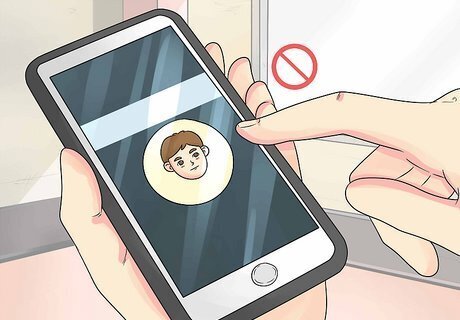
views
Give him time and space to cool off.

At this point, he's probably too frazzled and upset to resolve anything. You may want to try patching things up immediately and that’s understandable. Your boyfriend may not be ready, though, and you have to respect that. Suggest that you both take some time to cool off and get some perspective. Then, you can have a more rational discussion whenever he’s ready. You might say: "Alex, you’re upset and I understand, but this conversation isn’t helping. Tell me how much time and space you need before we discuss this again." If the idea of not talking to your guy for days doesn’t sit well with you, ask him if it’s okay to briefly check in via text every 1-2 days just to make sure he’s okay. It’s important to respect his privacy during this time. Try to avoid stalking his social media pages for “clues” or asking friends to check up on him.
Find out exactly why he’s upset.

Did he suddenly start giving you the silent treatment? Perhaps you two didn’t have a big fight; you thought everything was fine, but today he started acting differently. He’s clearly angry about something—but what? At this point, try to avoid jumping to conclusions. You can’t solve a problem if you don’t know what it is, so be direct and ask him what’s going on. You might say, "Erik, I can tell you’re upset with me, but I honestly have no idea why. Please tell me what’s bothering you so I can fix it." If he isn’t ready to talk about it yet, it’s best to respect his wishes. You’re more likely to resolves things when he’s ready.
Listen to his side with an open mind.

Try to put yourself in his shoes and see where he’s coming from. Give your boyfriend a chance to say everything he needs to say without interrupting him. That way, you’ll get to hear all of his thoughts and feelings about the situation. If you have questions, ask him when he’s finished. For now, just actively listen and do your best to see things from his perspective. If you interrupt him or jump in to defend yourself before he’s had a chance to tell his side, he’ll probably assume you aren’t interested in what he has to say.
Validate his feelings about the situation.

You don’t have to agree with his perspective to validate it. Perhaps your boyfriend didn’t have all of the facts. Because of that, his perspective of the situation is skewed, but you can still understand why he’d be angry. You aren’t admitting you did anything wrong or agreeing with his perspective; you’re simply validating his viewpoint. Say something like: "Ben, I totally get what you’re saying about feeling overwhelmed and confused. I would have felt the exact same way if I were in your shoes." "I’m glad you told me this, Randall. I had no idea that’s what you were thinking! I completely understand why you’d be mad at me about something like that." "Your feelings are completely reasonable, Derek. I'm so glad you told me."
Explain your side of things.

Now's your chance to share your perspective. If you have facts or insight that he didn’t have, share it now. If you made a mistake, admit to it without shifting blame or giving him any excuses for your behavior. Use “I” statements to talk about your feelings; “you” statements tend to feel confrontational. For example, you might say something like: "I know I should have told you about going to that party and it looks bad that I didn’t say anything. I didn't tell you because I didn’t want you to worry. I was with Kathy and Cheryl the entire night and we had each other’s backs." "I felt a bit left out when you decided to go out with your friends last Saturday instead of on a date with me. I trust you and I want you to have a good time with your friends, I really do. I shouldn’t have texted you repeatedly and ruined the night for you. That wasn’t fair of me."
Apologize for your role in the situation.

If you’ve done something wrong, take responsibility for that. Even if it's hard, admit that you messed up and give him a genuine apology. Don't try to minimize or rationalize your behavior if you made a mistake—own it. His forgiveness is probably going to hinge a lot on how heartfelt and genuine your apology feels, so do your best. You might say something like: ”I’m truly sorry that I said that to you, Dillon. I spoke in anger without pausing to think first. I didn’t mean what I said. Going forward, I’ll be careful not to do that sort of thing again.”
Be mindful of your tone and language.

Extreme language like “always” and “never” tends to be polarizing. That language tends to feel sort of accusatory (even if you don’t mean it that way) and makes it sound like you’ve judged your boyfriend in some way. Softer language like “This comes up sometimes” and “You don’t always do this, but yesterday you did...” tends to feel more neutral. For example, instead of saying, “You never listen to me!” try “Sometimes I worry that you don’t hear what I’m saying.”
Look for a compromise to resolve the issue.

A compromise is a solution that you're both satisfied with. If you're fighting about who gets to pick where you're going to eat or what you're doing this weekend, you could compromise by deciding to take turns. This weekend, he can choose; next weekend, it's your turn. Try to find a middle ground that you're both happy with. For example: If you're arguing about spending time with your friends or his friends this weekend, try alternating days so you're spending time with both groups: Friday you'll hang with your friends and Saturday you'll chill with his. If he's upset about always paying for food, gas, and drinks when you go out, tell him you'll start chipping in and paying half.
Agree to disagree if you can't compromise.

Try to let go of the need to “win” every argument. If you and your boyfriend can’t resolve a minor issue, sometimes it’s best just to drop the matter altogether. After all, is something so minor really worth all that time and energy? You don’t have to have the last word or be in total agreement to move forward. Will this argument matter in a week? If you can’t come to an agreement and it’s truly minor, just agree to disagree. The goal is to move forward with your guy.
Try to make it up to him if you can.

If you can't fix the original issue, maybe you can do the next best thing. For example, if you lost, borrowed, or broke something that belonged to him, make it up to him by replacing the item with a new one. Replacing the item doesn't completely rectify the situation, but it's a nice gesture that your boyfriend will appreciate. For example, if you borrowed his favorite hoodie and damaged it, buy him a new hoodie. It can be exactly like his previous one, you could upgrade to an even cooler hoodie, or even ask him to pick out the one he wants.
Avoid making the same mistake again.

You can't change the past, but do your best not to repeat it. A genuine apology is crucial, but if you don’t back it up with actions going forward, your apology really didn’t mean much. Try to see conflicts as opportunities to learn more about your boyfriend and grow closer. For example: If your boyfriend was upset about you texting your ex, commit to not doing it again. You could even go one step further and erase your ex from your contact lists and social media accounts. You didn’t fix the original problem, but you still resolved the situation in the end.
Talk to someone if he gets mad at you a lot.

Does your boyfriend get angry or pick fights over nothing? Just because your boyfriend is “mad at you” doesn’t mean you did anything wrong. If it seems like your boyfriend creates conflict between you on purpose and then blames or punishes you for causing it, that’s manipulative, abusive behavior. Talk to someone you trust and see what they think. If you don’t have anyone you can talk to and you live in the United States, you can call the National Domestic Violence Hotline at 1-800-799-7233 (SAFE) for support and advice. To live chat with someone, visit their website directly at https://www.thehotline.org/.




















Comments
0 comment